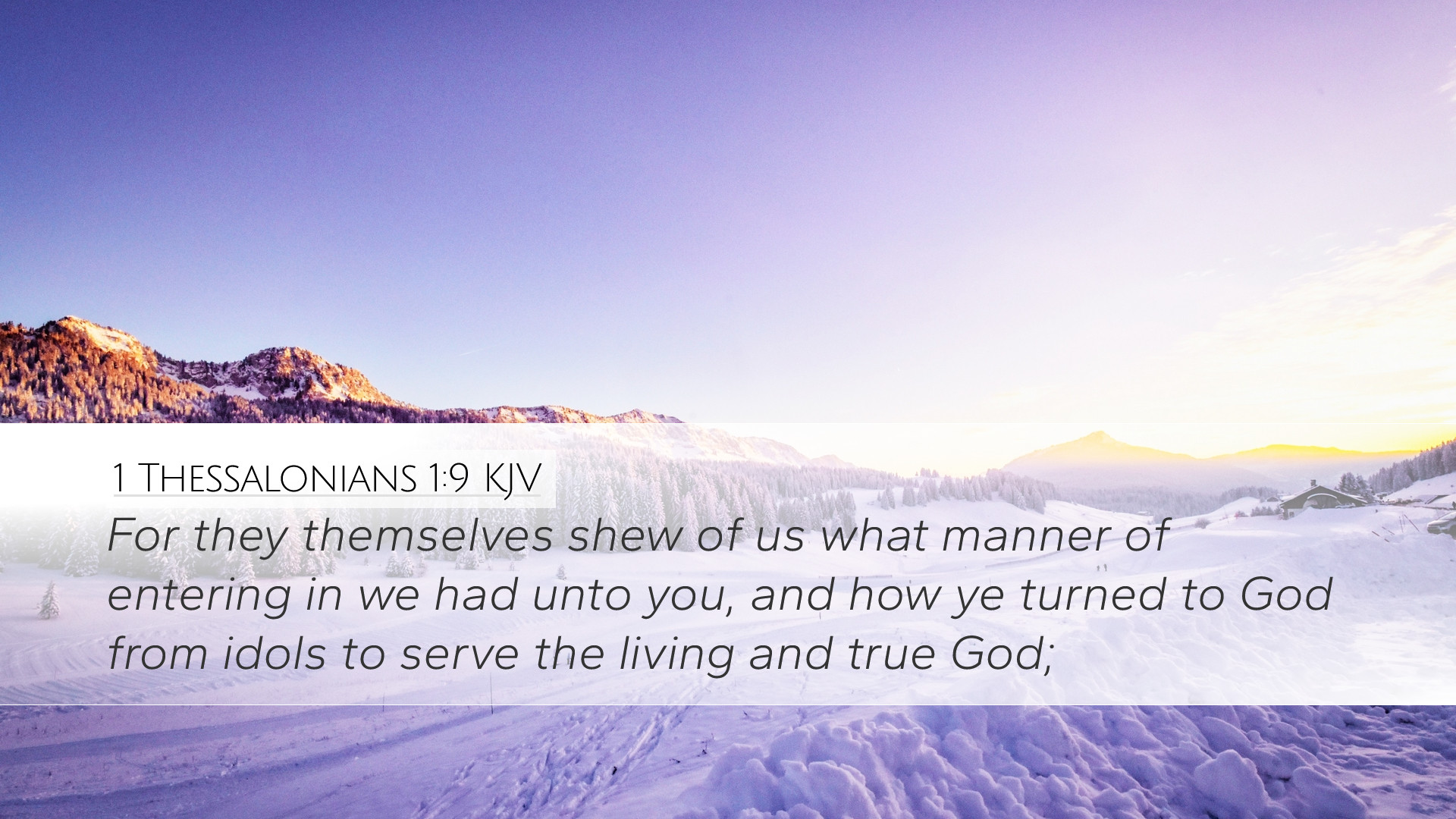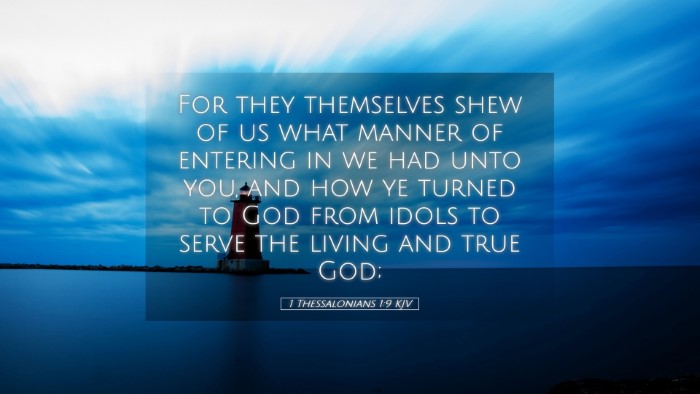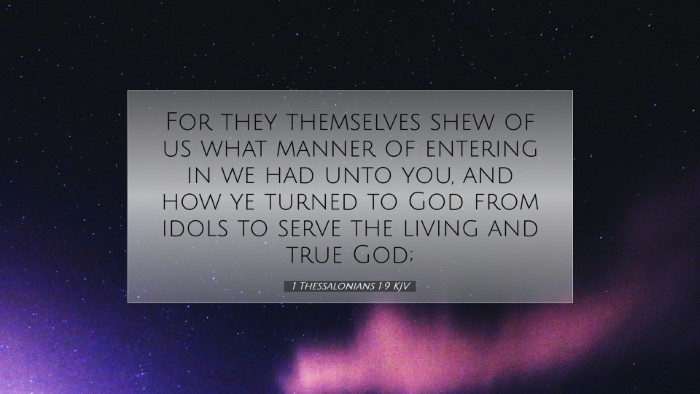Old Testament
Genesis Exodus Leviticus Numbers Deuteronomy Joshua Judges Ruth 1 Samuel 2 Samuel 1 Kings 2 Kings 1 Chronicles 2 Chronicles Ezra Nehemiah Esther Job Psalms Proverbs Ecclesiastes Song of Solomon Isaiah Jeremiah Lamentations Ezekiel Daniel Hosea Joel Amos Obadiah Jonah Micah Nahum Habakkuk Zephaniah Haggai Zechariah Malachi1 Thessalonians 1:9
1 Thessalonians 1:9 KJV
For they themselves shew of us what manner of entering in we had unto you, and how ye turned to God from idols to serve the living and true God;
1 Thessalonians 1:9 Bible Commentary
Commentary on 1 Thessalonians 1:9
Verse Reference: 1 Thessalonians 1:9 - “For they themselves report concerning us the kind of reception we had among you, and how you turned to God from idols to serve the living and true God.”
Introduction
The Apostle Paul, in his letter to the Thessalonians, expresses profound gratitude for the transformation that took place among the believers in Thessalonica. This transformation, moving from idolatry to the worship of the one true God, serves as a significant theme that touches deeply upon issues of faith, conversion, and community testimony. This commentary aims to explore the insights provided by renowned public domain scholars, offering a comprehensive understanding of the verse.
Contextual Analysis
In the preceding verses, Paul commends the Thessalonian church for their faith and love, setting the stage for his remarks in verse 9. The Thessalonian Christians were living in a Greco-Roman context heavily influenced by idolatry, and their turn to the living God represents a radical shift that stands as a testament to divine power and grace.
Insights from Matthew Henry
Matthew Henry, in his commentary, emphasizes the significance of the report mentioned by Paul. He notes that the testimony of others concerning our faith can be a powerful tool for evangelism. Henry points out that the Thessalonians' transformation was not merely for their benefit but served as a compelling narrative that drew the community's attention to the truth of Christianity.
- Witness of Conversion: Henry highlights that the change in lifestyle — from idol worship to serving God — was startling and noteworthy. Such a change is often indicative of genuine faith and highlights the work of the Holy Spirit.
- Active Service: The commentary underscores the latter part of the verse, which mentions serving the “living and true God.” Henry remarks that true faith is often evidenced by a life of service, which is central to the Christian life.
Insights from Adam Clarke
Adam Clarke provides a thorough examination of the phrase “turned to God from idols.” He posits that this demonstrates an essential component of true repentance, which involves turning away from falsehoods and embracing the reality of God's existence and sovereignty.
- Idols and False Worship: Clarke notes that idols represent anything that takes precedence over God. In the context of the Thessalonians, these were not only wooden or stone images but also the various vices and distractions that held sway over their lives.
- True Worship: Reflecting on how they turned to “serve the living and true God,” Clarke emphasizes that this service is characterized by a personal relationship, not a mere ritualistic approach. It reflects a heartfelt commitment fueled by love for God and a desire to honor Him above all.
Insights from Albert Barnes
Albert Barnes addresses the communal aspect of their conversion. He remarks that the conversion of individuals has a collective impact that spreads beyond personal transformations, influencing the church and its outreach efforts.
- Influence on Others: Barnes points out that the report of the Thessalonians’ change would have resulted in a wider acknowledgment of Christian faith in the surrounding community, establishing Thessalonica as a beacon of the gospel truth.
- Enduring Faith: He concludes that the persistence of their faith and testimony is relevant not only for the contemporary church but also serves as an example for future generations regarding the power of God to transform lives.
Doctrinal Implications
The verse speaks powerfully about the theme of conversion and repentance. It illustrates the fundamental Christian doctrine that true faith involves a radical shift from sin and idolatries to embrace a living relationship with God through Christ.
- Nature of Repentance: The transformative act of turning to God signifies deep repentance, reflecting a sincere acknowledgment of the futility of prior pursuits.
- The Role of Servanthood: Emphasizing that true conversion manifests itself in a life committed to serving God underscores the practical outworking of faith.
Application for Today
For pastors, students, and theologians, 1 Thessalonians 1:9 serves as a potent reminder of the power of testimony in a Christian’s life. It calls believers to reflect on their own journeys of faith and the extent to which they have turned away from idols in their lives.
- Self-Reflection: It invites introspection on what "idols" may exist in the lives of modern believers, whether they are materialistic pursuits, personal ambitions, or even cultural influences that detract from a full commitment to God.
- Evangelism through Testimony: The testimony of one’s faith journey can inspire change in others. This verse encourages believers to share their stories of conversion, exemplifying the transformative work of God.
- True Discipleship: Finally, it challenges the church to engage in active service as a reflection of their faith, embodying Christ’s love in their communities and the world around them.
Conclusion
1 Thessalonians 1:9 captures the essence of the Christian experience: the joyous transition from death to life, from idols to the living God. The insights provided by Matthew Henry, Adam Clarke, and Albert Barnes illuminate the profound implications of this verse for individual believers as well as the community of faith as a whole. As we assess our own allegiances and callings, may we be inspired to turn wholly to God, live faithfully, and serve diligently.


